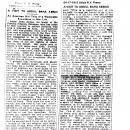Main menu
- ‘Abdu’l-Bahá’s Journey
- World Peace
- Stopping Racism in America
- Empowerment of Women
- More Principles...
- Prayer for America
A Visit to ‘Abdu’l-Bahá Abbas
An American Girl Tells of a Memorable Experience in Her Life.
‘Abdu’l-Bahá Abbas, the leader of the Persian religion, Bahá’ísm, who has come to this country to deliver lectures, was long a prisoner at Acca. An American girl, who was present when word of freedom was received, tells in the New York Post of her meeting with the great man. She happened to be in Palestine and Syria in the summer of 1908, during the last days of the old regime of ‘Abdul Hamid, the tyrant. Her party was at Haifa, a few miles from Acca. Driving over to Acca the young woman was taken to a courtyard, where she was left for a time. Then she was taken to the apartments of ‘Abdu’l-Bahá, where she met his wife and two daughters. She describes him as follows:
“I greeted him reverently and shook hands. He looked deeply into my eyes and bade me a cordial welcome. I have heard of pilgrims who have fallen at his feet. But his manner to me showed no expectation of such a greeting, nor did he seem offended by my manner. I regarded him with deep interest. What I first saw was an old man, who had suffered. His clothes, the loose garments and white turban of the Oriental, were poor. His skin was like a piece of wrinkled parchment, and his gray locks fallen over his shoulders were scanty. His features were strong and dignified, and, as I looked longer, I saw that his eyes were remarkable. They were large and blue and around the iris was a wide circle of black. They were the eyes of a mystic, and the eyes of one who understands men. Calm and loving, they yet seemed to see all that I was and was not. He seated himself cross-legged and invited me to ask him questions. Mirza Ameen sat opposite me and interpreted from Persian to English, with unobtrusive perfection. “The Master,” for, indeed, he seemed such to me, as he talked, a master of life and religion, said many beautiful things, some clear and simple, and some suggesting depths of thought, and many full of Oriental imagery. He made no claims to unusual knowledge: indeed, once he disclaimed such, but he is, without doubt, of profound insight.”
The young woman dined with ‘Abdu’l-Bahá and his family, sitting at the head of the table and being offered the best the house afforded. She says: “Then a curious element was introduced, ‘Abdu’l-Bahá, who had been in the courtyard, talking to the Governor of the town, came up with a fresh news from Constantinople by official wire that the Sultan had granted a constitution to his beloved people and that all political prisoners were free. It was hard to believe and very wonderful. ‘Abdu’l-Bahá said: “This is a beautiful act of his majesty; he was not forced to do it, but has given it of his own free will to the people. I honor him.” I was impressed with this charitable judgment of a monarch who had persecuted him and his people for a generation, and can still see the sweetness of his face as he uttered it, but it was historically wrong, for ‘Abdul Hamid had most assuredly been forced at the cannon’s mouth to cede the constitution to Young Turkey.
“The news of that day has changed the life of ‘Abdu’l-Bahá and his family. They are no longer prisoners, and it is due to the constitution that he is able to travel. He has many disciples in our country. He assured me that my coming to Acca had been auspicious and that they should always associate me with the coming of freedom. Mirza Ameen said: ‘We can go out of the city openly, for now we are free,’ so I drove forth with my American hat on by head and my Persian escort by my side.”
‘Abdu’l-Bahá Abbas, the leader of the Persian religion, Bahá’ísm, founded by his father. Bahá’u’lláh, has lived since childhood in the dingy fortress of Acca, the old St. Jean d’Arcre which was besieged by our Richard the Lionhearted. Thence have flowed the sayings of Bahá’u’lláh, edited and translated into modern tongues, also many utterances of ‘Abdu’l-Bahá, and thither have gone a stream of pilgrims to see the master and converse with him on high and holy themes. Some have gone almost in a spirit of worship, looking with reverence on the saintly old man, whose life has been one of exile, poverty and suffering, and yet who has expressed naught but love and helpfulness. Others have gone in a spirit of inquiry, perhaps to accuse an impostor, or to condemn a heretic (for such he is to the Moslems), or merely to inquire what manner of man this maybe. One of the venerable missionaries of Syria paid ‘Abdul Abbas a visit, and asked him sternly whether he claimed divinity. “The Master” humbly, if somewhat evasively, replied that he was “but the servant of the servants of God.” It would have been a fine sight to see those two splendid patriarchs facing one another; the American ascetic-looking, upright, saintly, his keen eyes trying to penetrate the other’s soul; the Oriental, of looser build, his old robes suggesting poverty, and in his mystic eyes infinite love and comprehension of the man who could not understand him.
‘Abdu’l-Bahá, on this, his first visit to the United States, will visit all of the principal cities of the country, making addresses not only before the Bahá’í assemblies, but before audiences of all cults and all denominations, as well as many college and university settlements and educational societies.









